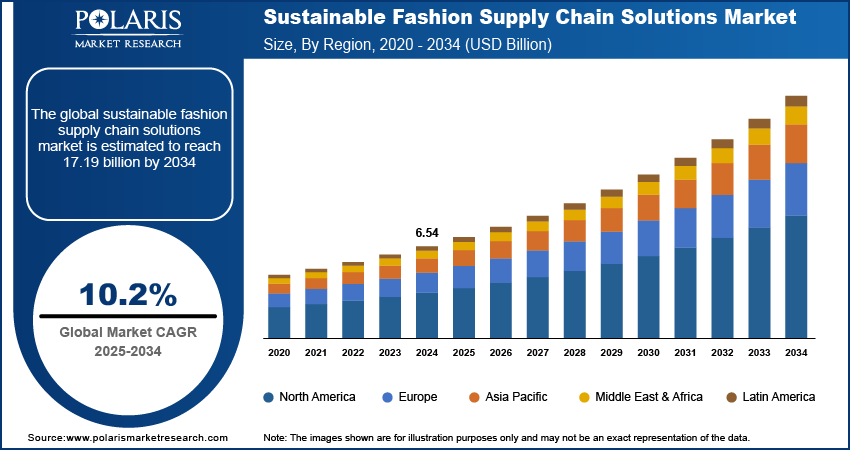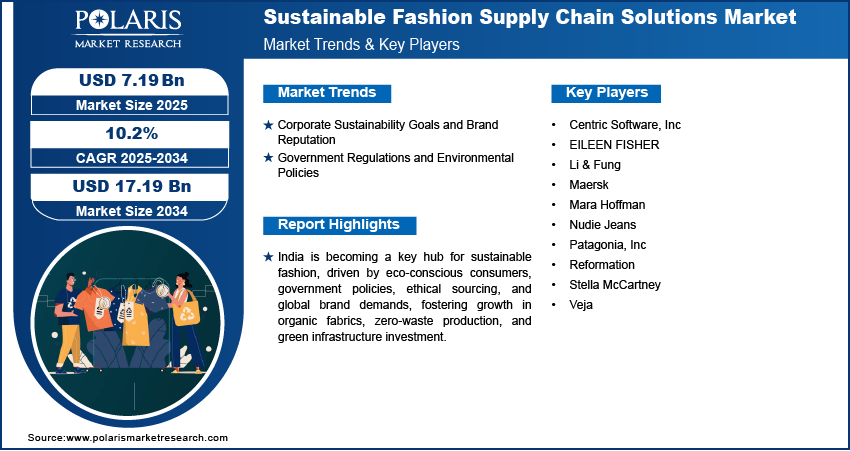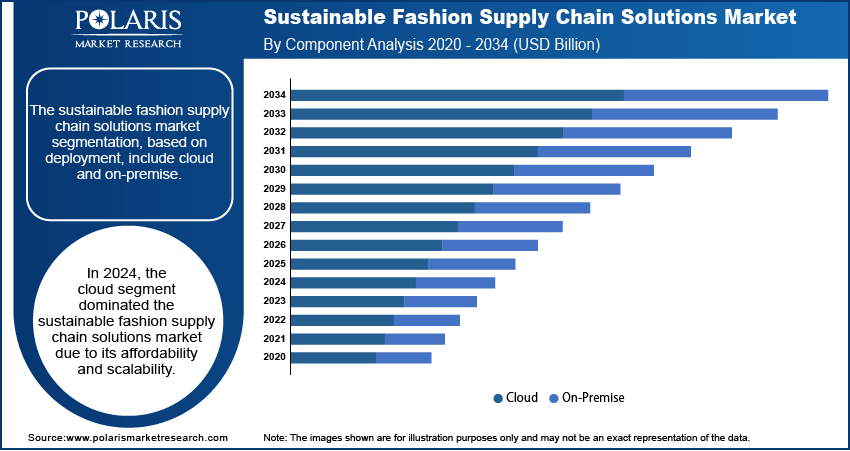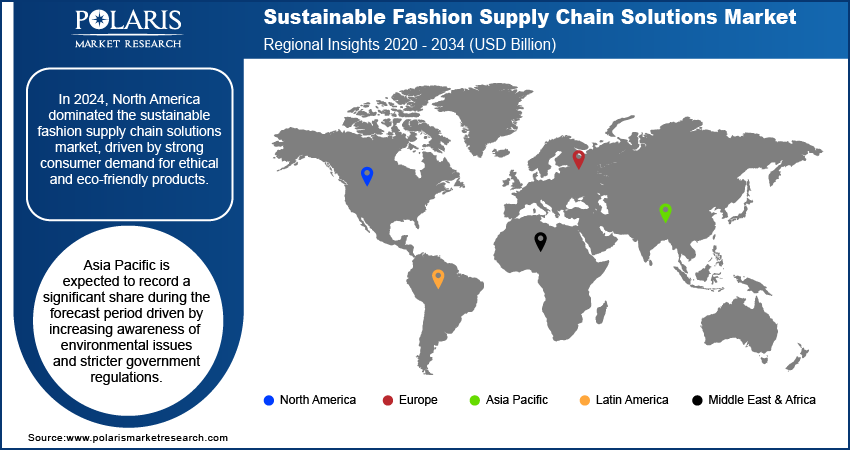
Sustainable Fashion Supply Chain Solutions Market Size, Share, Trends, Industry Analysis Report: By Solution Type, Deployment (Cloud and On-Premise), Organization Size, End User, and Region (North America, Europe, Asia Pacific, Latin America, and Middle East & Africa) – Market Forecast, 2025–2034
- Published Date:Apr-2025
- Pages: 125
- Format: PDF
- Report ID: PM5458
- Base Year: 2024
- Historical Data: 2020-2023
Sustainable Fashion Supply Chain Solutions Market Overview
Sustainable fashion supply chain solutions market size was valued at USD 6.54 billion in 2024. The market is projected to grow from USD 7.19 billion in 2025 to USD 17.19 billion by 2034, exhibiting a CAGR of 10.2% during the forecast period.
Sustainable fashion supply chain solutions involve eco-friendly sourcing, ethical production, and circular economy practices to minimize environmental and social impact. These solutions include using organic materials, reducing waste, improving labor conditions, and implementing transparent, low-carbon logistics.
The fashion industry is shifting from a linear “take-make-dispose” model to a circular economy, where products are designed for longevity, reuse, and recycling. Second-hand fashion, rental services, and upcycling are gaining popularity, reducing textile waste. Brands are developing take-back programs, where customers return old clothes for recycling or resale. Governments and NGOs support these initiatives through incentives and awareness campaigns. Brands save money, create less waste, and attract customers who care about the environment by using circular supply chain models. These models help lower production costs and reduce the amount of waste sent to landfills. The demand for sustainable fashion supply chain solutions grows as more companies adopt these sustainable practices.

To Understand More About this Research: Request a Free Sample Report
Innovations in material science and production technology have made sustainability more accessible. The rise of biodegradable fabrics, recycled textiles, and bio-based materials has reduced the industry’s reliance on resource-intensive materials such as cotton and polyester. Additionally, advancements in 3D printing, AI-driven supply chain management, and blockchain for transparency have improved efficiency and sustainability. These developments help brands minimize waste, reduce energy consumption, and enhance traceability. As technology continues to evolve, sustainable fashion solutions become more affordable and scalable, encouraging wider adoption across the industry and driving the growth of the sustainable fashion supply chain solutions market.
Sustainable Fashion Supply Chain Solutions Market Dynamics
Corporate Sustainability Goals and Brand Reputation
Many fashion brands are setting high sustainability goals to boost their reputation and meet investor expectations. Big companies such as Adidas, H&M, and Patagonia have promised to lower their carbon footprint and use more sustainable materials. Consumers, investors, and other stakeholders expect companies to truly commit to environmental and social responsibility. Brands that include sustainability in their supply chains earn customer trust and gain a competitive edge. On the other hand, companies that ignore this trend risk facing criticism, boycotts, and a drop in customer loyalty. This makes sustainability not only a moral duty but also an important business strategy, which helps grow the market for sustainable fashion supply chain solutions.
Government Regulations and Environmental Policies
Governments worldwide are enforcing stricter regulations to reduce pollution and waste in the fashion industry. Policies such as extended producer responsibility (EPR), carbon emission limits, and bans on hazardous chemicals are compelling brands to adopt sustainable supply chain solutions. In some regions, companies disclose their supply chain practices and ensure ethical labor conditions. Non-compliance can lead to hefty fines, legal action, and reputational damage. Fashion brands are investing in sustainable sourcing, circular economy initiatives, and eco-friendly production methods to align with legal requirements and global sustainability goals as regulations become more stringent, thereby driving the sustainable fashion supply chain solutions market demand.

Sustainable Fashion Supply Chain Solutions Market Segment Analysis
Sustainable Fashion Supply Chain Solutions Market Assessment by Solution Type
The sustainable fashion supply chain solutions market segmentation, based on solution type, includes sustainable sourcing and procurement, transparency and traceability, waste reduction, circular economy solutions, carbon footprint management, and others. The circular economy solutions segment is expected to witness significant growth during the forecast period. This growth is driven by increasing consumer preference for resale, rental, and upcycled fashion, along with stricter regulations on textile waste. Many brands are investing in recycling programs and take-back initiatives to extend product life cycles as awareness of sustainable consumption rises, thereby driving the segmental growth in the global market.
Sustainable Fashion Supply Chain Solutions Market Evaluation by Deployment
The sustainable fashion supply chain solutions market is segmented by deployment into cloud and on-premise. The cloud segment dominated the market in 2024, driven by its scalability, cost-effectiveness, and real-time data accessibility. Cloud-based solutions help fashion brands track sustainability metrics, optimize inventory, and ensure transparency across global supply chains. Companies are adopting cloud technology to enhance visibility and efficiency with increasing regulatory requirements and consumer demand for ethical fashion, thereby driving the segment’s leading position.

Sustainable Fashion Supply Chain Solutions Market Regional Insights
By region, the study provides the sustainable fashion supply chain solutions market insights into North America, Europe, Asia Pacific, Latin America, and the Middle East & Africa. In 2024, North America dominated the market driven by strong consumer demand for ethical and eco-friendly products. Major brands and retailers in the US and Canada are adopting green supply chain practices, such as using recycled materials, ethical sourcing, and AI-driven logistics optimization. Government regulations and sustainability initiatives, such as carbon reduction policies and waste management programs, are also encouraging businesses to adopt greener solutions. The presence of leading sustainable fashion brands and increasing investment in digital supply chain technologies further boost the growth of the sustainable fashion supply chain solutions market in North America.
Asia Pacific is expected to record a significant sustainable fashion supply chain solutions market share during the forecast period driven by increasing awareness of environmental issues and stricter government regulations. Countries such as China, Japan, and South Korea are investing in eco-friendly manufacturing processes, while fashion brands are focusing on reducing carbon emissions and textile waste. Many global brands rely on Asian suppliers, leading to a growing push for transparent and ethical sourcing. The region’s strong manufacturing base, combined with emerging sustainability policies and consumer awareness, are driving the market growth in Asia Pacific.
The sustainable fashion supply chain solutions market in India is experiencing substantial growth driven by its rich textile heritage, growing eco-conscious consumer base, and government-led sustainability initiatives. Many Indian fashion brands are shifting towards organic fabrics, ethical labor practices, and zero-waste production. The government’s push for sustainable textile policies and incentives for eco-friendly manufacturing encourages businesses to adopt greener practices. Additionally, global brands sourcing from India are demanding better transparency and ethical compliance, further driving market development in the country.

Sustainable Fashion Supply Chain Solutions Market Key Players & Competitive Analysis Report
The sustainable fashion supply chain solutions market opportunity is constantly evolving, with numerous companies striving to innovate and distinguish themselves. Leading global corporations dominate the market by leveraging extensive research and development, and advanced techniques. These companies pursue strategic initiatives such as mergers, acquisitions, partnerships, and collaborations to enhance their product offerings and expand into new markets.
New companies are impacting the industry by introducing innovative products to meet the demand of specific market sectors. According to the sustainable fashion supply chain solutions market analysis, this competitive trend is amplified by continuous progress in product offerings. Major players in the sustainable fashion supply chain solutions industry include Centric Software, Inc; EILEEN FISHER; Li & Fung; Maersk; Mara Hoffman; Nudie Jeans; Patagonia, Inc; Reformation; Stella McCartney; and Veja.
Maersk, officially A.P. Møller – Mærsk A/S, is a Danish multinational conglomerate founded in 1904 and headquartered in Copenhagen, Denmark. The company operates across 130 countries. Maersk is the world’s second-largest container shipping company, managing over 700 vessels and offering services to 374 ports in 116 countries. Its business spans shipping, port operations, supply chain management, and logistics. This extensive network allows Maersk to provide comprehensive services to various industries, including fashion. In the fashion industry, Maersk focuses on reducing environmental impact through its supply chain operations. The company is exploring alternative fuels, such as methanol, for its vessels and developing more efficient transport options. Maersk aims to achieve significant reductions in carbon emissions, with targets set for 2030 and 2050. These efforts reflect broader industry trends toward more sustainable practices. By offering logistics solutions that consider environmental factors, Maersk helps fashion brands manage their supply chains while addressing environmental concerns. Maersk operates globally, with significant investments in regions like Southeast Asia. It plans to expand its warehousing and distribution capacity in key locations such as Singapore, Malaysia, Indonesia, and the Philippines.
Patagonia, Inc., founded in 1973 by Yvon Chouinard in Ventura, California, is a well-established retailer specializing in outdoor clothing, gear, and food. The company is known for its focus on environmental responsibility and sustainability. The company has over 100 stores worldwide and factories in 16 countries. Its product lines cater to outdoor activities such as climbing, surfing, skiing, fly fishing, and trail running, with an emphasis on durability and functionality using sustainable materials. For example, Patagonia has developed Yulex technology as a neoprene alternative for wetsuits and extensively uses recycled materials like polyester from post-consumer plastic bottles. Approximately 98% of its products now incorporate recycled materials. Patagonia manages its supply chain with a focus on environmental considerations. The company prioritizes the use of organic cotton and recycled materials, ensuring traceability through initiatives such as the Material Traceability program. It also provides detailed insights into the environmental and social impacts of its supply chain through the "Footprint Chronicles." Patagonia works with its factories to maintain ethical labor standards and encourages customers to extend the life of their products through repair and reuse programs like Worn Wear, which helps reduce waste. Patagonia's approach extends beyond its operations. It allocates a portion of its sales to environmental initiatives and uses renewable energy in its US facilities.
Key Companies in Sustainable Fashion Supply Chain Solutions Market
- Centric Software, Inc
- EILEEN FISHER
- Li & Fung
- Maersk
- Mara Hoffman
- Nudie Jeans
- Patagonia, Inc
- Reformation
- Stella McCartney
- Veja
Sustainable Fashion Supply Chain Solutions Market Segmentation
By Solution Type Outlook (Revenue USD Billion, 2020–2034)
- Sustainable Sourcing and Procurement
- Transparency and Traceability
- Waste Reduction
- Circular Economy Solutions
- Carbon Footprint Management
- Others
By Deployment Outlook (Revenue USD Billion, 2020–2034)
- Cloud
- On-Premise
By Organization Size Outlook (Revenue USD Billion, 2020–2034)
- Small and Medium Enterprises (SMEs)
- Large Enterprises
By End User Outlook (Revenue USD Billion, 2020–2034)
- Manufacturers
- Distributors
- Retailers
- Suppliers
- Consumer
- Others
By Regional Outlook (Revenue USD Billion, 2020–2034)
- North America
- US
- Canada
- Europe
- Germany
- France
- UK
- Italy
- Spain
- Netherlands
- Russia
- Rest of Europe
- Asia Pacific
- China
- Japan
- India
- Malaysia
- South Korea
- Indonesia
- Australia
- Rest of Asia Pacific
- Middle East & Africa
- Saudi Arabia
- UAE
- Israel
- South Africa
- Rest of Middle East & Africa
- Latin America
- Mexico
- Brazil
- Argentina
- Rest of Latin America
Sustainable Fashion Supply Chain Solutions Market Report Scope
|
Report Attributes |
Details |
|
Market size Value in 2024 |
USD 6.54 billion |
|
Market Size Value in 2025 |
USD 7.19 billion |
|
Revenue Forecast in 2034 |
USD 17.19 billion |
|
CAGR |
10.2% from 2025–2034 |
|
Base Year |
2024 |
|
Historical Data |
2020–2023 |
|
Forecast Period |
2025–2034 |
|
Quantitative Units |
Revenue in USD billion and CAGR from 2025 to 2034 |
|
Report Coverage |
Revenue Forecast, Market Competitive Landscape, Growth Factors, and Industry Trends |
|
Segments Covered |
|
|
Regional Scope |
|
|
Competitive Landscape |
|
|
Report Format |
|
|
Customization |
Report customization as per your requirements with respect to countries, regions, and segmentation. |
FAQ's
The sustainable fashion supply chain solutions market size was valued at USD 6.54 billion in 2024 and is projected to grow to USD 17.19 billion by 2034.
The global market is projected to register a CAGR of 10.2% during the forecast period, 2025-2034.
North America had the largest share of the global market in 2024.
The key players in the market are Centric Software, Inc; EILEEN FISHER; Li & Fung; Maersk; Mara Hoffman; Nudie Jeans; Patagonia, Inc; Reformation; Stella McCartney; and Veja.
The cloud segment dominated the sustainable fashion supply chain solutions market in 2024 due to its affordability and scalability.
The circular economy solutions segment is expected to witness significant growth in the forecast period, driven by increasing consumer preference for resale, rental, and upcycled fashion and stricter regulations on textile waste.
